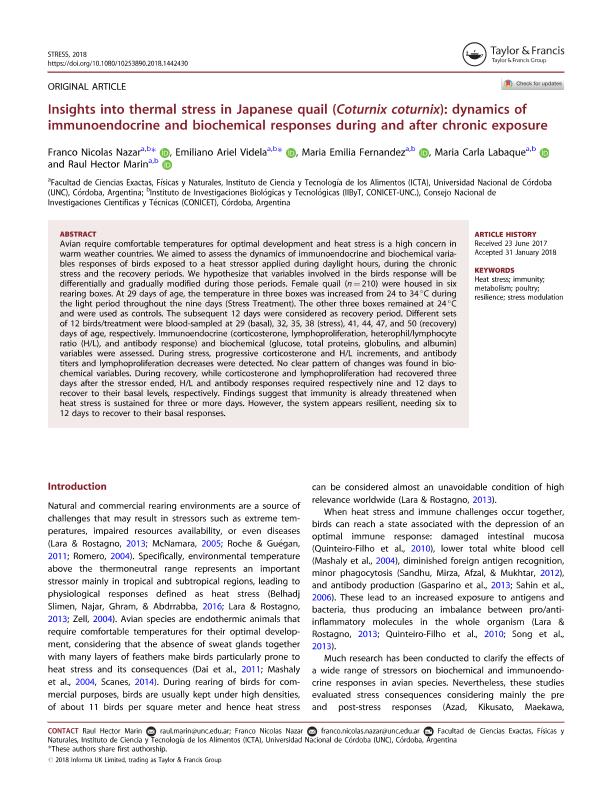Artículo
Insights into thermal stress in Japanese quail (Coturnix coturnix): Dynamics of immunoendocrine and biochemical responses during and after chronic exposure
Nazar, Franco Nicolas ; Videla, Emiliano Ariel
; Videla, Emiliano Ariel ; Fernández, María Emilia
; Fernández, María Emilia ; Lábaque, María Carla
; Lábaque, María Carla ; Marin, Raul Hector
; Marin, Raul Hector
 ; Videla, Emiliano Ariel
; Videla, Emiliano Ariel ; Fernández, María Emilia
; Fernández, María Emilia ; Lábaque, María Carla
; Lábaque, María Carla ; Marin, Raul Hector
; Marin, Raul Hector
Fecha de publicación:
25/01/2018
Editorial:
Taylor & Francis Ltd
Revista:
Stress
ISSN:
1025-3890
e-ISSN:
1607-8888
Idioma:
Inglés
Tipo de recurso:
Artículo publicado
Clasificación temática:
Resumen
Avian require comfortable temperatures for optimal development and heat stress is a high concern in warm weather countries. We aimed to assess the dynamics of immunoendocrine and biochemical variables responses of birds exposed to a heat stressor applied during daylight hours, during the chronic stress and the recovery periods. We hypothesize that variables involved in the birds response will be differentially and gradually modified during those periods. Female quail (n = 210) were housed in six rearing boxes. At 29 days of age, the temperature in three boxes was increased from 24 to 34 °C during the light period throughout the nine days (Stress Treatment). The other three boxes remained at 24 °C and were used as controls. The subsequent 12 days were considered as recovery period. Different sets of 12 birds/treatment were blood-sampled at 29 (basal), 32, 35, 38 (stress), 41, 44, 47, and 50 (recovery) days of age, respectively. Immunoendocrine (corticosterone, lymphoproliferation, heterophil/lymphocyte ratio (H/L), and antibody response) and biochemical (glucose, total proteins, globulins, and albumin) variables were assessed. During stress, progressive corticosterone and H/L increments, and antibody titers and lymphoproliferation decreases were detected. No clear pattern of changes was found in biochemical variables. During recovery, while corticosterone and lymphoproliferation had recovered three days after the stressor ended, H/L and antibody responses required respectively nine and 12 days to recover to their basal levels, respectively. Findings suggest that immunity is already threatened when heat stress is sustained for three or more days. However, the system appears resilient, needing six to 12 days to recover to their basal responses.
Palabras clave:
HEAT STRESS
,
IMMUNITY
,
METABOLISM
,
POULTRY
,
RESILIENCE
,
STRESS MODULATION
Archivos asociados
Licencia
Identificadores
Colecciones
Articulos(IIBYT)
Articulos de INSTITUTO DE INVESTIGACIONES BIOLOGICAS Y TECNOLOGICAS
Articulos de INSTITUTO DE INVESTIGACIONES BIOLOGICAS Y TECNOLOGICAS
Citación
Nazar, Franco Nicolas; Videla, Emiliano Ariel; Fernández, María Emilia; Lábaque, María Carla; Marin, Raul Hector; Insights into thermal stress in Japanese quail (Coturnix coturnix): Dynamics of immunoendocrine and biochemical responses during and after chronic exposure; Taylor & Francis Ltd; Stress; 21; 3; 25-1-2018; 257-266
Compartir
Altmétricas



